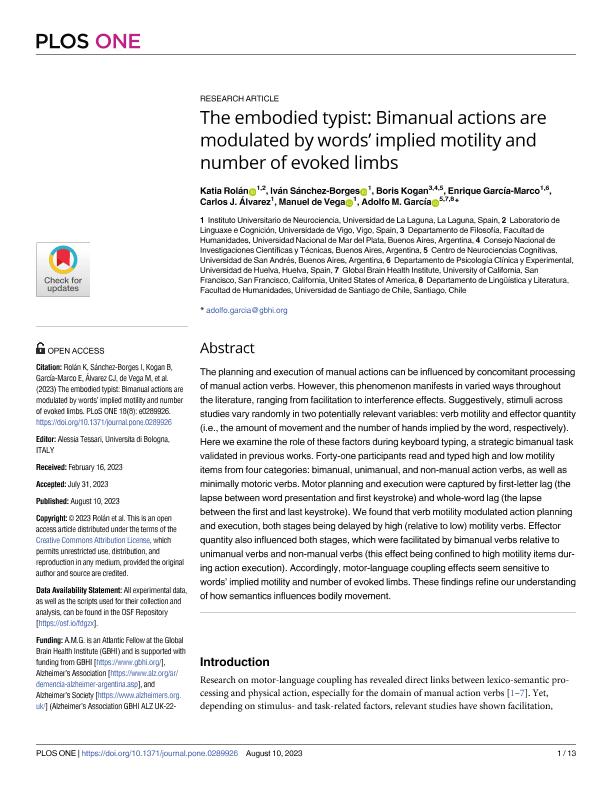Mostrar el registro sencillo del ítem
dc.contributor.author
Rolán, Katia
dc.contributor.author
Sánchez Borges, Iván
dc.contributor.author
Kogan, Boris

dc.contributor.author
García Marco, Enrique
dc.contributor.author
Álvarez, Carlos J.
dc.contributor.author
de Vega, Manuel
dc.contributor.author
García, Adolfo Martín

dc.date.available
2023-12-14T13:14:05Z
dc.date.issued
2023-08
dc.identifier.citation
Rolán, Katia; Sánchez Borges, Iván; Kogan, Boris; García Marco, Enrique; Álvarez, Carlos J.; et al.; The embodied typist: Bimanual actions are modulated by words’ implied motility and number of evoked limbs; Public Library of Science; Plos One; 18; 8; 8-2023; 1-13
dc.identifier.issn
1932-6203
dc.identifier.uri
http://hdl.handle.net/11336/220330
dc.description.abstract
The planning and execution of manual actions can be influenced by concomitant processing of manual action verbs. However, this phenomenon manifests in varied ways throughout the literature, ranging from facilitation to interference effects. Suggestively, stimuli across studies vary randomly in two potentially relevant variables: verb motility and effector quantity (i.e., the amount of movement and the number of hands implied by the word, respectively). Here we examine the role of these factors during keyboard typing, a strategic bimanual task validated in previous works. Forty-one participants read and typed high and low motility items from four categories: bimanual, unimanual, and non-manual action verbs, as well as minimally motoric verbs. Motor planning and execution were captured by first-letter lag (the lapse between word presentation and first keystroke) and whole-word lag (the lapse between the first and last keystroke). We found that verb motility modulated action planning and execution, both stages being delayed by high (relative to low) motility verbs. Effector quantity also influenced both stages, which were facilitated by bimanual verbs relative to unimanual verbs and non-manual verbs (this effect being confined to high motility items during action execution). Accordingly, motor-language coupling effects seem sensitive to words’ implied motility and number of evoked limbs. These findings refine our understanding of how semantics influences bodily movement.
dc.format
application/pdf
dc.language.iso
eng
dc.publisher
Public Library of Science

dc.rights
info:eu-repo/semantics/openAccess
dc.rights.uri
https://creativecommons.org/licenses/by/2.5/ar/
dc.subject
EMBODIED COGNITION
dc.subject.classification
Lingüística

dc.subject.classification
Lengua y Literatura

dc.subject.classification
HUMANIDADES

dc.subject.classification
Psicología

dc.subject.classification
Psicología

dc.subject.classification
CIENCIAS SOCIALES

dc.title
The embodied typist: Bimanual actions are modulated by words’ implied motility and number of evoked limbs
dc.type
info:eu-repo/semantics/article
dc.type
info:ar-repo/semantics/artículo
dc.type
info:eu-repo/semantics/publishedVersion
dc.date.updated
2023-12-12T15:43:37Z
dc.journal.volume
18
dc.journal.number
8
dc.journal.pagination
1-13
dc.journal.pais
Estados Unidos

dc.journal.ciudad
San Francisco
dc.description.fil
Fil: Rolán, Katia. Universidad de La Laguna; España. Universidad de Vigo; España
dc.description.fil
Fil: Sánchez Borges, Iván. Universidad de La Laguna; España
dc.description.fil
Fil: Kogan, Boris. Consejo Nacional de Investigaciones Científicas y Técnicas; Argentina. Universidad Nacional de Mar del Plata. Facultad de Humanidades. Departamento de Filosofía; Argentina. Centro de Neurociencias Cognitivas ; Rectorado ; Universidad de San Andres;
dc.description.fil
Fil: García Marco, Enrique. Universidad de La Laguna; España. Universidad de Huelva; España
dc.description.fil
Fil: Álvarez, Carlos J.. Universidad de La Laguna; España
dc.description.fil
Fil: de Vega, Manuel. Universidad de La Laguna; España
dc.description.fil
Fil: García, Adolfo Martín. Consejo Nacional de Investigaciones Científicas y Técnicas; Argentina. Centro de Neurociencias Cognitivas ; Rectorado ; Universidad de San Andres; . University of California; Estados Unidos. Universidad de Santiago de Chile; Chile
dc.journal.title
Plos One

dc.relation.alternativeid
info:eu-repo/semantics/altIdentifier/url/https://journals.plos.org/plosone/article?id=10.1371/journal.pone.0289926
dc.relation.alternativeid
info:eu-repo/semantics/altIdentifier/doi/https://doi.org/10.1371/journal.pone.0289926
Archivos asociados
